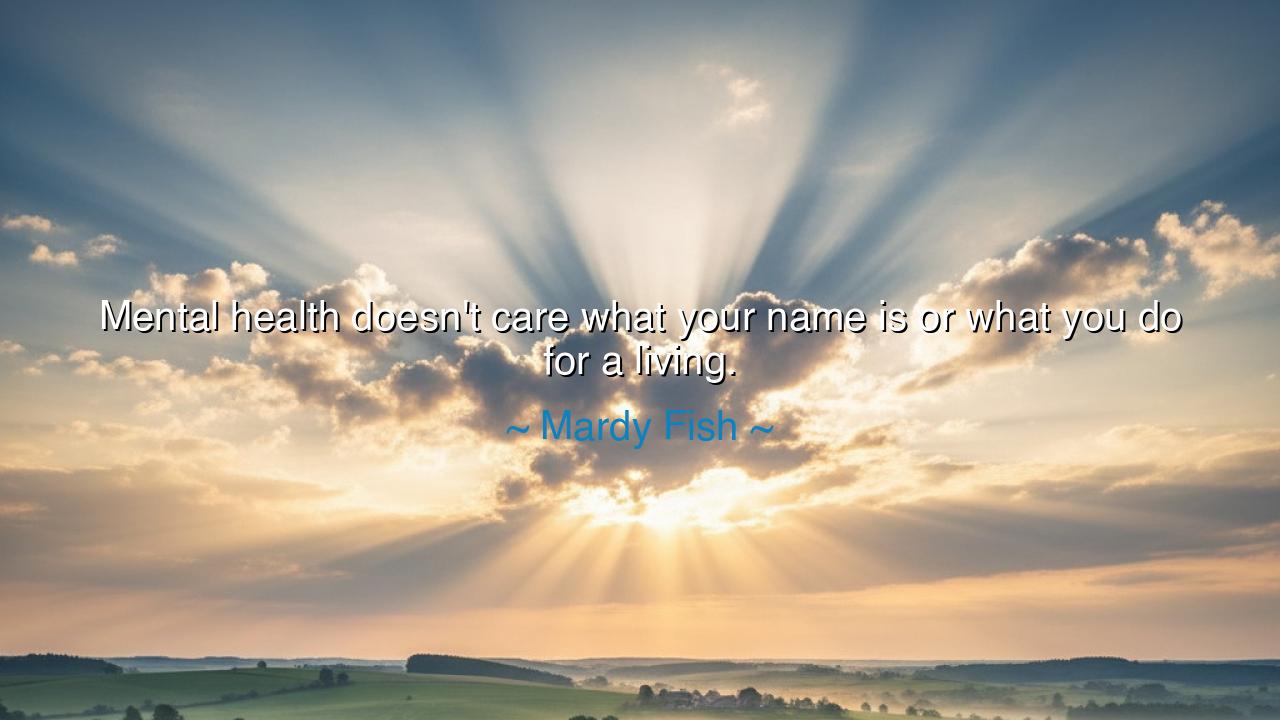
Mental health doesn't care what your name is or what you do for a






In the solemn yet liberating words of Mardy Fish, the champion who faced both triumph and turmoil, we hear a truth that humbles kings and comforts the broken: “Mental health doesn’t care what your name is or what you do for a living.” These words are not the polished thoughts of a philosopher in his study, but the confession of a warrior who battled an invisible enemy. Mardy Fish, once a celebrated tennis star at the height of his career, spoke these words after confronting the shadow of anxiety that gripped his mind even as the world cheered his name. From the fire of personal struggle, he emerged not with trophies, but with wisdom — a wisdom that reminds us that the battles of the mind are no respecter of fame, fortune, or title.
To understand his meaning is to understand the universal nature of the human heart. The mind, though hidden within, is the seat of all experience — it is both the creator of our joys and the birthplace of our fears. And when mental illness takes root, it cares not for the ornaments of status or the armor of success. The crown does not protect the king from sorrow, nor does the sword defend the warrior from despair. The farmer in the field and the celebrity on the stage may both wrestle with the same silent darkness. Fish’s words strip away the illusion that greatness, wealth, or prestige can shield one from the fragility of the human spirit. In this, he speaks the oldest truth: that we are all equal in our vulnerability, and that courage is not in pretending to be unbreakable, but in admitting that we are not.
Mardy Fish himself walked through this fire in the public eye. At the 2012 U.S. Open, after years of grueling training and rising success, he found himself unable to step onto the court. A panic attack seized him with such intensity that he feared for his life. To the world, he was a hero — strong, disciplined, admired — but within, he was drowning. His journey through therapy, acceptance, and recovery became a beacon for others who suffered silently. In revealing his truth, he broke the illusion that strength means silence. In showing his vulnerability, he displayed a courage far greater than any victory in sport. His quote stands as a timeless torch: a reminder that mental health is the great equalizer, and that even the brightest stars can dim when the weight of the mind grows heavy.
The ancients would have understood this paradox well. The mighty Alexander the Great, conqueror of nations, who wept because there were no more worlds to conquer, was said to be tormented by loneliness and melancholy. The philosopher Seneca, wise and revered, wrote that the mind can be both “a tyrant and a liberator.” They knew that the battles of the heart and mind are fiercer than those fought with sword or spear. To heal the spirit requires not power, but humility; not pride, but compassion. Fish’s words echo their wisdom — for the greatest conquest is not over kingdoms, but over the storms that rage within one’s own soul.
There is a quiet heroism in admitting our fragility. In a world that worships productivity and perfection, to say “I am struggling” is to defy the illusion of strength. Mental health asks for no titles and recognizes no hierarchy — it comes for the humble and the mighty alike. Yet in this truth lies hope: because if it touches all, then healing, too, belongs to all. When one voice, like Fish’s, speaks with honesty, it opens the door for countless others to step out of the shadows. Each confession becomes an act of collective courage — proof that even the strongest among us are still human, still learning, still growing.
The lesson of these words is simple yet profound: do not judge pain by the appearance of success. Do not assume that wealth, talent, or fame can silence the mind’s turmoil. Instead, learn to listen — to yourself, and to others. Seek help without shame; offer compassion without condition. The wise know that tending to the mind is as sacred as tending to the body, for one cannot flourish while the other falters. As Mardy Fish reminds us, there is no immunity from fear, but there is strength in facing it, and even greater strength in sharing the burden with others.
And so, dear listener, carry this wisdom like a light in the dark places of the heart: honor your humanity. Do not wait for despair to teach you that all are equal in struggle. Speak kindly to those who seem invincible, for even heroes stumble. Care for your mental health as you would a sacred flame — feed it with rest, honesty, and love. For in doing so, you will discover what Fish himself learned: that courage is not the absence of suffering, but the will to continue through it. The mind may wound, but it can also heal — and when we face it together, the deepest pain becomes the beginning of true strength.






AAdministratorAdministrator
Welcome, honored guests. Please leave a comment, we will respond soon